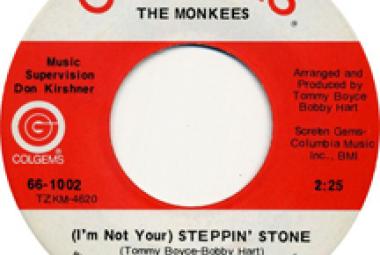Norman Petty (May 25, 1927 – August 15, 1984) was an American musician and record producer who is mostly known for his association with Buddy Holly and the Crickets, who recorded in his studio. (More from Wikipedia)
Buddy Holly and his band – by now known as the Crickets (they noticed crickets chirping in the studio one time while they were recording, or so the film The Buddy Holly Story maintains) – then began working at Norman Petty’s studio in New Mexico, concentrating in particular on what they considered their strongest song, “That’ll Be the Day” that they had never been able to satisfactorily record in the Decca studios. The recording was brought to the attention of Bob Thiele, an executive at Coral Records; though Thiele liked it, others at Coral were unenthusiastic.
Nevertheless, in March 1957, the Crickets signed with Brunswick Records. In order to avoid problems with Decca Records – even though Brunswick was a Decca subsidiary – Buddy Holly was not listed as a member of the Crickets on the original recording contract. Not surprisingly, this would create serious legal and financial problems for Buddy Holly in the future.
According to Norman Petty, “That’ll Be the Day” by the Crickets was released in May 1957 to “humor” Bob Thiele. The song became a #1 hit that summer; and before long, the jig was up as Decca Records executives realized that Buddy Holly was their bandleader. However, as Cyndi Lauper observed in her 1984 hit song, “Money Changes Everything”, so Decca Records released Buddy Holly from his original contract restriction. As a condition though, Buddy Holly was signed individually to Coral Records (yet another Decca subsidiary); thus, Buddy Holly was in the unusual position of being bound by two recording contracts at the same time – his earlier contract as a member of the Crickets and this new one as an individual artist.
* * *
Buddy Holly split from both the Crickets and Norman Petty in the fall of 1958 and was thus free to pursue his new musical visions. Unfortunately, he got only a meager settlement when Norman Petty’s books were found to be in hopeless disarray – probably Petty took a big slice of the pie for himself, though there was no way to prove it.
With a new, pregnant wife, and short on money, Buddy Holly signed on for the “Winter Dance Tour” package tour of the Midwest. It was during this tour that Holly was killed in the airplane crash in February 1959, along with Ritchie Valens, The Big Bopper. and the pilot Roger Peterson. Buddy Holly was just 22 years old.
(June 2013/1)
* * *
When a young band or musician is just starting out, they would often come to the recording studio with a handful of finished songs and others that were only partially written. The more experienced record producer or arranger would then help the band flesh out the other songs and, as a result, frequently receive partial credit for having written the songs.
This was also used as a device to compensate the producer. On many of Buddy Holly’s records, their producer Norman Petty is listed as one of the songwriters; and the same is true of Robert ‘Bumps’ Blackwell on those by Little Richard.
Sometimes Buddy Holly himself isn’t credited as a songwriter; that happened with one of his best known recordings, “Peggy Sue”, but at Jerry Allison’s insistence, his name was added to the credits after his death.
(April 2015/1)















